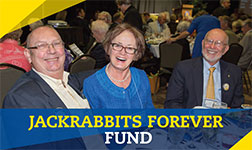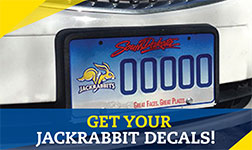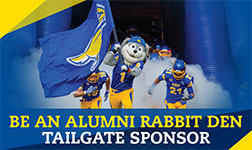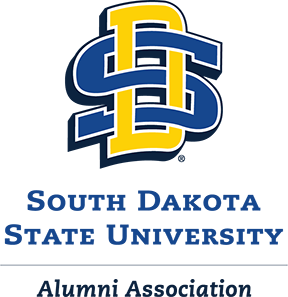Bob Bartling of the well-known Jackrabbit athletic Bartling family is now a retired Brookings businessman who most days is the sitting curmudgeon, curator and unofficial head librarian of one of the nation’s best track, field and running libraries.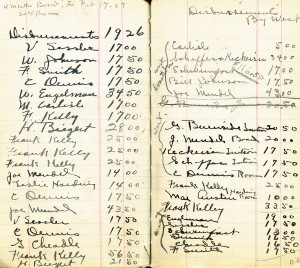
He holds court at his old business, Bartling Shoe Store, now owned by Lyle Claussen, and located down the street from Nick’s Hamburger Shop. Bob receives visits from runners and track and field enthusiasts, including many visiting alumni who drop by to talk running with their old friend.
Bob even has a road race named after him.
His brothers, the late Lorne ’38 and Herb ’51, were well-known Jackrabbit athletes. Bob participated in Jackrabbit sports, too, and he’s often out there still with the younger runners, admittedly barely moving, but doing mouth-drying, blue-lip jogging that most 85-year-olds would avoid.
He may now occasionally sell a running shoe at the store, but he’s mostly wrapped up in his unique library in a corner of the store where sportsmen and women migrate for known or obscure running information.
He’s been building his library for more than four decades.
Earl Bartling’s ledgers
I mention Bob’s running library because that’s where, among many one-of-a-kind running documents, he also keeps two small and treasured booklets that are prized SDSU sports artifacts.
They’re notebooks in which his father, the late furniture merchant Earl Bartling, jotted the names and donations of Brookings businessmen to fund athletic scholarships at State College in the 1920s and 1930s.
Those little books tell of the first organized efforts to raise money for tuition, room, and board for Jackrabbit student-athletes. It paved the way for the start by then-Athletic Director Stan Marshall and Assistant Harry Forsyth of the $1 a month Jackrabbit Club in 1958.
The donor names contacted annually by Earl Bartling, Cliff James, and other expert arm twisters record who gave how much, and what student-athletes received it.
Today about $3 million is needed annually to provide nearly 300 Jackrabbit student athletes with financial help. That figure grows each year because of ballooning costs.
In Earl Bartling’s day, just a few thousands dollars helped several dozen State athletes pay for food, housing, books, and tuition.
$200 bought a lot of Nickburgers
For example, in 1928 Red Owl Store gave $10; Waltz Hardware, $15; Fred Cole, $25; Charlie Poole (the barber-poet) $10; George and Elmer Sexauer $25; and bankers Van and Horace Fishback, grocer George Wells, and auto dealer Iver Dybdahl were also generous donors. Usually, SDSU benefactor Charlie Coughlin wanted to be on the list and insisted on giving the most, some years more than $200.
In 1928 an all-you-can-eat Brookings Café dinner was fifty cents. Beef roasts at Red Owl were 18 cents a pound. A $10 bill got you a sack of 200 Nickburgers.
Well-known State athletes are listed in Earl’s book. Future Green Bay Packer Wert Englemann got $17.50 for tuition, and more for meals that in 1926 were figured at $20 a month.
Contrary to today’s strict NCAA rules, Bartling often passed along cold, hard cash to Coach West, who handed it out to athletes, including $56.50 to future pro baseball player Frank Kelly in 1928.
Those of you reading this probably now help fund a favored scholarship at State. Earl Bartling and Cliff James would be proud.





